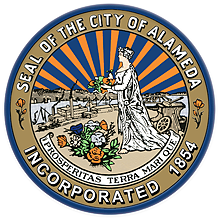Attend Free Tenant & Landlord Workshops Every Second and Fourth Tuesday of the Month
Updated September 6, 2017
Rent and eviction matters are currently governed by Ordinance 3148 (Rent Review, Rent Stabilization and Limitations on Evictions Ordinance), which was adopted by the City Council in March 2016, and approved by the voters as Measure L1 in November 2016.
On June 6, 2017, the Alameda City Council adopted Ordinance 3180 which would have amended Ordinance 3148 by: (1) eliminating “no cause” as a ground for eviction; and (2) requiring that if a tenant has a “fixed term” lease and that fixed term lease was renewed, the tenant is entitled to relocation payments if the tenant vacates at the end of the subsequent term.
A referendum petition with 7,295 signatures was submitted to the Alameda City Clerk on June 26, 2017, and on July 17, 2017, the Registrar of Voters certified that, based on a random sampling technique provided for under the Elections Code, the number of valid signatures on the petition was 129.88 percent of the total number of signatures needed to qualify the referendum for the ballot.
Frequently Asked Questions
1. What is the current status of Ordinance 3180 and Ordinance 3148?
Answer: On September 5, 2017 the City confirmed that there were enough signatures on the referendum petition against Ordinance 3180 that the Council could either put the matter on the ballot or have a first reading to rescind the ordinance. The Council voted 4-1 to rescind Ordinance 3180. Once Ordinance 3180 has been rescinded the amendments to Ordinance 3148 reflected in Ordinance 3180 will be permanently set aside, and the same or substantially same amendments cannot be enacted for a period of one year after repeal.
Proponents of a Charter Amendment (see FAQ below) regarding rent stabilization submitted 10,284 signatures, with 7,211 needed to qualify the measure for the ballot. The next step is for the County Registrar of Voters to determine if enough signatures are valid and return the petition to the City Council to put on the ballot. At that time, the City Council will need to confirm these signatures and decide what date the measure will appear on the ballot. If this measure passes, an amended Ordinance 3148 would be in the City Charter and could only be modified or repealed by a vote of the people. If the measure does not pass, Ordinance 3148 as affirmed by voters in November 2016 will remain in place.
2. What is the outcome of the declarations of misconduct that were filed stating wrongdoing by signature gatherers?
Answer: The Alameda County District Attorney’s Office has determined that no actionable wrongdoing was found in connection with signature gathering for a referendum of a recent rent stabilization ordinance amendment.
On June 6, 2017, the Alameda City Council adopted Ordinance No. 3180, amending Ordinance No. 3184, Alameda’s Rent Review, Rent Stabilization and Limitations on Evictions Ordinance. Ordinance 3180 eliminated “no cause” as a ground for eviction, required relocation fees be paid to a tenant vacating a rental unit at the end of a subsequent fixed term lease, and made other clarifying changes. However, a referendum petition was submitted to the Alameda City Clerk on June 26, which delayed the effectiveness of Ordinance 3180. Sufficient signatures were obtained to require that the Council either rescind Ordinance 3180 or place it on a ballot for Alameda voters to decide.
The District Attorney reported that it had reviewed several dozen declarations alleging violations of Section 18600 of the California Elections Code, along with a letter received from Assemblymember Rob Bonta to the Alameda City Council, and a letter addressed to Assemblymember Bonta from The Sutton Law Firm.
The District Attorney concluded that none of the information it received substantiated criminal charges under Elections Code Section 18600.
Specifically, the District Attorney found that twenty-five out of thirty-seven (25 of 37) declarations contained no allegation of fraud or misconduct and the remaining twelve (12) declarations were unlikely to be proved.
Regardless of which side of the issue a person is on, the District Attorney assessed that all of the relevant discussion of this issue falls under the general topic of rent control. The paid signature gatherers were specifically instructed by their employer to say the issue was regarding rent control, which was technically true, and the law provides protections to the individuals who were merely doing what they were instructed to do (meaning they were not intentionally misleading or misrepresenting the topic).
3. What happens to Ordinance 3180 now that the referendum petition has qualified?
Answer: The amendments to Ordinance 3148 contained in Ordinance 3180 are suspended, including the amendment to Ordinance 3148 that would have eliminated “no cause” evictions.
4. What happens if Ordinance 3180 is repealed by the City Council?
Answer: If Ordinance 3180 is repealed, the amendments to Ordinance 3148 are set aside. In addition, the same or substantially same amendments cannot be enacted for a period of one year after repeal.
5. Where can I read the text of Ordinance 3148?
Answer: Ordinance 3148 can be viewed electronically using this link: https://library.municode.com/ca/alameda/codes/code_of_ordinances?nodeId=CHVIBUOCIN_ARTXVRESTLIEVOR_6-58.10TI
Alternatively, you can obtain a hard copy by visiting the City Clerk’s Office at City Hall: 2263 Santa Clara Avenue, #380, Alameda, CA 94501.
6. Where can I read the text of Ordinance 3180?
Answer: Ordinance 3180 can be viewed electronically using this link: http://docs.ci.alameda.ca.us/WebLink8/0/doc/456207/Page1.aspx
Alternatively, you can obtain a hard copy by visiting the City Clerk’s Office at City Hall: 2263 Santa Clara Avenue, #380, Alameda, CA 94501.
7. What is the new charter amendment initiative measure that proponents of the initiative are seeking to qualify for the ballot
Answer: Proponents of “A Proposed City of Alameda Charter Amendment Making the ‘City of Alameda Rent Review, Rent Stabilization and Limitations of Evictions Ordinance’ a Part of the Alameda City Charter” are currently gathering signatures to qualify the initiative for the ballot. The proposed measure reconstitutes Ordinance 3148 as a charter amendment with two changes. It would: (1) eliminate the Alameda City Council’s authority to amend Ordinance 3148, and (2) eliminate the December 31, 2019 sunset provision. If the measure were to pass, Ordinance 3148 would become a charter provision (without the amendments in Ordinance 3180, which is also the subject of referendum campaign) until the voters take action to modify or repeal it.
8. Do signature gatherers have to be residents of Alameda?
Answer: No.
9. It is legal for signature gatherers to be paid?
Answer: Yes.
10. There have been allegations of misrepresentation by signature gatherers and intimidation tactics in attempts to gather or prevent signatures. What can I do about that?
Answer: The referendum and initiative signature gathering and election process is a fundamental element of democracy and protected as free speech. If you believe signature gatherers are misrepresenting an issue, a complaint can be filed with the Alameda County District Attorney’s Office by contacting the Alameda Police Department. If someone is attempting to intimidate you into signing or not signing an initiative or referendum petition or obstructing your ability to participate in the democratic process, you should call the Alameda Police Department, as such activity could constitute a crime.
11. Who can I contact for additional information?
- For general assistance with Alameda’s rent program, please contact the Housing Authority at (510) 747-4346 or visit www.alamedarentprogram.org.
- For legal issues or questions about the ordinance, please contact the City Attorney’s office at (510) 747-4750.
- For assistance with the newly established residential rental housing fee, please contact the Finance Department at (510) 747-4881.
- To file a complaint regarding misrepresentation by signature gatherers or if someone is obstructing your ability to participate in the democratic process, please contact the Alameda Police Department at (510) 337-8340.
![]() Click Here to Download a PDF of this FAQ
Click Here to Download a PDF of this FAQ
Previously Published FAQs
Frequently Asked Questions
1. What happens if the referendum does not get enough signatures to qualify?
Answer: Ordinance 3180 will go into effect.
2. What happens if the referendum qualifies and voters do not support Ordinance 3180?
Answer: Ordinance 3148 (Measure L1 on the November 2016 ballot) remains in effect without amendment. The City Council would be prohibited from adopting another amendment to Ordinance 3148 addressing the same subject matter as the failed Ordinance 3180 for one year after the referendum election.
3. What happens if the referendum qualifies and the voters support Ordinance 3180?
Answer: Ordinance 3180 becomes effective immediately after the vote is certified by the City Council.
4. What happens if Ordinance 3180 is submitted to voters at a future election?
Answer: If the Council decides to submit the ordinance to voters at a future election, it must 1) decide the election date, and 2) approve the ballot question and determine its interest in authoring a ballot argument in favor or against the measure. If the measure passes, Ordinance 3180 becomes effective immediately. If the measure fails, Ordinance 3148 remains in effect without amendment. Moreover, if the measure fails, the City Council would be prohibited from adopting another amendment to Ordinance 3148 that is essentially the same as the failed Ordinance 3180 for one year after the election.
5. What happens if the charter amendment initiative also qualifies for the same ballot as the referendum measure?
Answer: If both measures qualify and the City Council calls for an election at which both measures would be on the same ballot, voters would be presented with both ballot measures.
6. How much time do the proponents of the charter amendment initiative have to gather signatures?
Answer: 180 days from when the proponents received the title and summary, which was on July 13, 2017.
7. How many signatures does it take for a ballot measure to qualify?
Answer: A referendum petition requires the signatures of 10 percent of the qualified registered City of Alameda voters, which was 4,808 signatures, whereas an initiative petition to amend the City Charter requires 15 percent of the signatures of qualified registered City of Alameda voters, which is 7,211 signatures.
8. If the referendum has enough signatures to qualify and the City Council calls for an election, will Alameda taxpayers have to pay for an election?
Answer: Yes, the cost of an election would be incurred by the City of Alameda.
9. What happens if Ordinance 3180 is submitted to voters at a future election?
Answer: If the Council decides to submit the ordinance to voters at a future election, it must 1) decide the election date, and 2) approve the ballot question and determine its interest in authoring a ballot argument in favor or against the measure. If the measure passes, Ordinance 3180 becomes effective immediately. If the measure fails, Ordinance 3148 remains in effect without amendment. Moreover, if the measure fails, the City Council would be prohibited from adopting another amendment to Ordinance 3148 that is essentially the same as the failed Ordinance 3180 for one year after the election.






